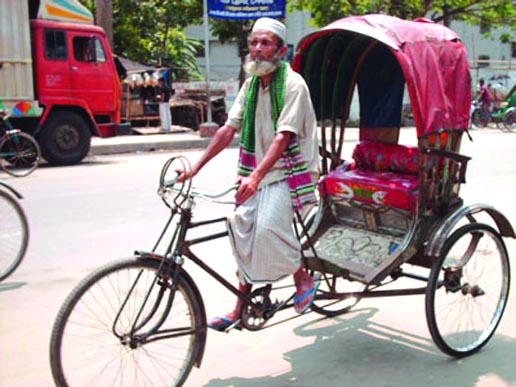
UNB, Dhaka :
Though Bangladesh is set to emerge as a middle-income country, its capital is still replete with rickshaws as the city authorities are unable to implement any comprehensive phase-out programme.
Experts said, lack of planning as well as mass transports and weakness in transport management are the main barriers towards removing the rickshaws from the city.
Then erstwhile undivided Dhaka City Corporation (DCC) issued licenses for around 79,554 rickshaws in 1982. Since then, the city authorities have been renewing those licenses but did not issue any fresh one.
But, the number of unauthorised rickshaws is sharply increasing day by day despite eviction drives by the traffic department of Dhaka Metropolitan Police (DMP) against the illegal slow-moving three-wheelers.
There is no exact statistics about the exact number of illegal rickshaws, which are plying the city streets.
Md Insur Ali, General Secretary of Jatiya Rickshaw-Van Sramik League, told UNB that around 2.50 lakh illegal rickshaws have been plying the city streets showing documents issued by various organisations of rickshaw-van owners.
Among them, around 35,000 unregistered rickshaws have been plying under his organisation, while 80,000 under Muktijuddha Samonnoy Parishad, 30,000-40,000 under Bangladesh Muktijhoddah Sagsad, while others are operated by various organisations and individuals as well.
Besides, around 1,40,000 rickshaws have been plying duplicating city corporation’s registered number plates, Insur Ali alleged.
Replying to a question, he said the then DCC in a joint meeting on June 6 in 2001 decided to provide registration to 35,000 rickshaws and 8,000 vans. “But, the authorities are yet to issue the new licenses although the rickshaw owners are ready to give Tk 16.77 crore in revenue to the government for the period of 2001-2015.”
Insur Ali, however, recognised that rickshaw pulling is an inhuman work. “So, we demand the government distribute CNG-run auto rickshaws among the rickshaw owners as well as the rickshaw pullers through cooperatives,” he added.
He also suggested providing training and alternative jobs to rehabilitate those interested in giving up rickshaw pulling.
Contacted, Town Planner Prof Nazrul Islam said the authorities have failed to phase out rickshaws from the capital for lack of planning and weakness of proper transport management.
Unless the facilities of mass transports – commuter train, metro rail and Bus Rapid Transit (BRT) — are not fully implemented in the city, the dependence on rickshaws will be there, he said.
“It needs 5-10 years to fully implement the projects of metro rail and BRT. The problem will turn severe until the projects are not fully implemented,” Prof Nazrul added.
Though Bangladesh is set to emerge as a middle-income country, its capital is still replete with rickshaws as the city authorities are unable to implement any comprehensive phase-out programme.
Experts said, lack of planning as well as mass transports and weakness in transport management are the main barriers towards removing the rickshaws from the city.
Then erstwhile undivided Dhaka City Corporation (DCC) issued licenses for around 79,554 rickshaws in 1982. Since then, the city authorities have been renewing those licenses but did not issue any fresh one.
But, the number of unauthorised rickshaws is sharply increasing day by day despite eviction drives by the traffic department of Dhaka Metropolitan Police (DMP) against the illegal slow-moving three-wheelers.
There is no exact statistics about the exact number of illegal rickshaws, which are plying the city streets.
Md Insur Ali, General Secretary of Jatiya Rickshaw-Van Sramik League, told UNB that around 2.50 lakh illegal rickshaws have been plying the city streets showing documents issued by various organisations of rickshaw-van owners.
Among them, around 35,000 unregistered rickshaws have been plying under his organisation, while 80,000 under Muktijuddha Samonnoy Parishad, 30,000-40,000 under Bangladesh Muktijhoddah Sagsad, while others are operated by various organisations and individuals as well.
Besides, around 1,40,000 rickshaws have been plying duplicating city corporation’s registered number plates, Insur Ali alleged.
Replying to a question, he said the then DCC in a joint meeting on June 6 in 2001 decided to provide registration to 35,000 rickshaws and 8,000 vans. “But, the authorities are yet to issue the new licenses although the rickshaw owners are ready to give Tk 16.77 crore in revenue to the government for the period of 2001-2015.”
Insur Ali, however, recognised that rickshaw pulling is an inhuman work. “So, we demand the government distribute CNG-run auto rickshaws among the rickshaw owners as well as the rickshaw pullers through cooperatives,” he added.
He also suggested providing training and alternative jobs to rehabilitate those interested in giving up rickshaw pulling.
Contacted, Town Planner Prof Nazrul Islam said the authorities have failed to phase out rickshaws from the capital for lack of planning and weakness of proper transport management.
Unless the facilities of mass transports – commuter train, metro rail and Bus Rapid Transit (BRT) — are not fully implemented in the city, the dependence on rickshaws will be there, he said.
“It needs 5-10 years to fully implement the projects of metro rail and BRT. The problem will turn severe until the projects are not fully implemented,” Prof Nazrul added.

